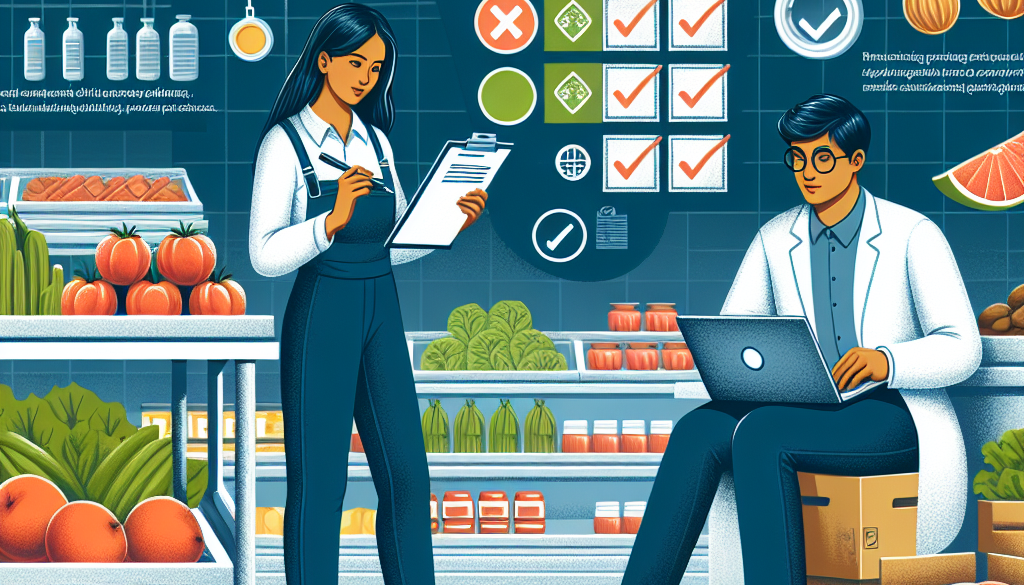Raising Food Safety Standards Through Audits and Inspections
-
Table of Contents
- Raising Food Safety Standards Through Audits and Inspections
- The Importance of Food Safety Audits
- Types of Food Safety Inspections
- Enhancing Food Safety Through Effective Audits
- Improving Inspections for Better Food Safety
- Global Food Safety Standards and Their Impact
- Challenges in Food Safety Audits and Inspections
- Conclusion: The Path Forward for Safer Food
- ETprotein: Your Partner in Food Safety and Quality
Raising Food Safety Standards Through Audits and Inspections

Food safety is a critical concern for consumers, producers, and governments worldwide. Ensuring the safety of the food supply chain is not just a matter of public health but also a significant factor in the economic stability and reputation of food producers and suppliers. Audits and inspections play a pivotal role in maintaining and raising food safety standards. This article delves into how these processes contribute to safer food practices and what can be done to enhance their effectiveness.
The Importance of Food Safety Audits
Food safety audits are systematic examinations of how food is handled at every stage of production, processing, and distribution. These audits are designed to identify potential hazards and ensure that food producers comply with the relevant safety standards and regulations. The benefits of conducting regular food safety audits include:
- Identifying potential areas of risk before they lead to health issues.
- Ensuring compliance with national and international food safety standards.
- Enhancing consumer confidence in food products.
- Reducing the likelihood of costly food recalls and associated brand damage.
Types of Food Safety Inspections
Inspections are another crucial component of the food safety ecosystem. They are typically carried out by regulatory agencies and can be announced or unannounced. Inspections can be:
- Compliance Inspections: To ensure that food businesses adhere to legal requirements.
- Monitoring Inspections: To regularly check on food safety practices.
- Investigative Inspections: To look into specific issues or complaints.
Both audits and inspections are essential for maintaining high food safety standards, but they serve different purposes and are conducted by different entities.
Enhancing Food Safety Through Effective Audits
To raise food safety standards, audits must be thorough, regular, and conducted by qualified professionals. The following strategies can help enhance the effectiveness of food safety audits:
- Using a risk-based approach to prioritize areas with the highest potential impact on food safety.
- Employing the latest technology, such as data analytics and mobile auditing apps, to streamline the audit process.
- Ensuring auditors have up-to-date training on the latest food safety standards and auditing techniques.
- Encouraging transparency and open communication between auditors and food businesses.
Improving Inspections for Better Food Safety
Inspections are only as effective as the inspectors conducting them. To improve the quality of inspections, the following measures can be implemented:
- Providing continuous training for inspectors on new regulations and industry practices.
- Implementing standardized inspection protocols to ensure consistency.
- Utilizing technology to collect and analyze inspection data for trends and insights.
- Encouraging collaboration between regulatory bodies and food businesses to foster a culture of food safety.
Global Food Safety Standards and Their Impact
International food safety standards, such as those set by the Codex Alimentarius Commission, provide a benchmark for food safety practices around the world. Adherence to these standards can help harmonize food safety regulations, making it easier for food businesses to operate across borders and for consumers to trust the safety of imported foods. Statistics show that countries that adopt and enforce these standards experience fewer instances of foodborne illnesses and related health issues.
Challenges in Food Safety Audits and Inspections
Despite the clear benefits, there are challenges in implementing effective food safety audits and inspections, including:
- Limited resources and funding for regulatory agencies.
- Complexity of the global food supply chain.
- Differences in food safety regulations across countries.
- Resistance from food businesses due to perceived costs and disruptions.
Addressing these challenges requires a concerted effort from all stakeholders in the food industry, including governments, food producers, and consumers.
Conclusion: The Path Forward for Safer Food
Raising food safety standards through audits and inspections is an ongoing process that requires commitment, innovation, and collaboration. By enhancing the effectiveness of these tools, we can work towards a future where foodborne illnesses are rare and consumer trust in the food supply is unshakeable. The key takeaways for improving food safety through audits and inspections include adopting a risk-based approach, utilizing technology, ensuring continuous training for professionals, and fostering a culture of safety and transparency within the food industry.
ETprotein: Your Partner in Food Safety and Quality
In the context of food safety, protein products are no exception to the rigorous standards required for consumer health. ETprotein company’s protein products stand out as an example of commitment to quality and safety. Their extensive range of organic bulk vegan proteins and L-(+)-Ergothioneine (EGT) products meet the highest standards of purity and safety, catering to various industries while ensuring non-GMO, allergen-free attributes.
For businesses looking to source reliable and safe protein ingredients, ETprotein offers a trustworthy option. Their adherence to food safety practices aligns with the stringent audits and inspections discussed in this article, making them a valuable partner for companies aiming to raise their food safety standards.
About ETprotein:
ETprotein, a reputable protein and L-(+)-Ergothioneine (EGT) Chinese factory manufacturer and supplier, is renowned for producing, stocking, exporting, and delivering the highest quality organic bulk vegan proteins and L-(+)-Ergothioneine. They include Organic rice protein, clear rice protein, pea protein, clear pea protein, watermelon seed protein, pumpkin seed protein, sunflower seed protein, mung bean protein, peanut protein, and L-(+)-Ergothioneine EGT Pharmaceutical grade, L-(+)-Ergothioneine EGT food grade, L-(+)-Ergothioneine EGT cosmetic grade, L-(+)-Ergothioneine EGT reference grade and L-(+)-Ergothioneine EGT standard. Their offerings, characterized by a neutral taste, non-GMO, allergen-free attributes, with L-(+)-Ergothioneine purity over 98%, 99%, cater to a diverse range of industries. They serve nutraceutical, pharmaceutical, cosmeceutical, veterinary, as well as food and beverage finished product distributors, traders, and manufacturers across Europe, USA, Canada, Australia, Thailand, Japan, Korea, Brazil, and Chile, among others.
ETprotein specialization includes exporting and delivering tailor-made protein powder and finished nutritional supplements. Their extensive product range covers sectors like Food and Beverage, Sports Nutrition, Weight Management, Dietary Supplements, Health and Wellness Products, and Infant Formula, ensuring comprehensive solutions to meet all your protein needs.
As a trusted company by leading global food and beverage brands and Fortune 500 companies, ETprotein reinforces China’s reputation in the global arena. For more information or to sample their products, please contact them and email sales(at)ETprotein.com today.












